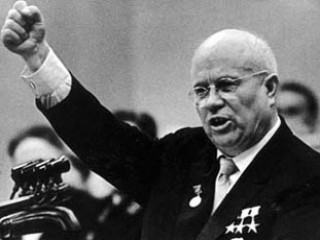
Nikita S. Khrushchev biography
Date of birth : 1894-04-17
Date of death : 1971-09-11
Birthplace : Kalinovka, Russia
Nationality : Russian
Category : Politics
Last modified : 2012-01-25
Credited as : political leader, post-Stalin period, first secretary
The Soviet political leader Nikita Sergeevich Khrushchev (1894-1971) was a major force in world politics in the post-Stalin period.
Nikita Khrushchev was born in Kalinovka in southern Russia on April 17, 1894. At 15 he became an apprentice mechanic in Yuzovka, where his father was working as a miner. When his apprenticeship ended, he was employed as a machine repairman in coal mines and coke plants of the region.
In 1918 Khrushchev joined the Communist party, and he enrolled in the Red Army to fight in the civil war then in progress. After nearly 3 years of service, he returned to Yuzovka and was appointed assistant manager of a mine. Soon thereafter, he entered the Donets Industrial Institute, from which he graduated in 1925. He then took up his career as a full-time party official, beginning as secretary of a district party committee near Yuzovka.
Four years later Khrushchev attended the Industrial Academy in Moscow for training in industrial administration, leaving in 1931 to become secretary of a district party committee in Moscow. Within 4 years he became head of the party organization of Moscow and its environs, thus joining the highest ranks of party officialdom. In Moscow he used his industrial training as he helped to supervise the construction of the city's subway system.
When Stalin began purging the Communist party's leadership of those he mistrusted, Khrushchev was fortunate to be one of the trusted. In 1938, when most of the chief party leaders in the Ukraine were purged, he was made first secretary of the Ukrainian Communist party and at the same time was named to the Politburo, the ruling body of the Soviet Communist party. As first secretary, he was in fact, though not in name, the chief executive of the Ukraine. Except for a short interval in 1947, he retained his authority in that area until 1949.
During World War II, while still first secretary of the Ukrainian Communist party, Khrushchev served in the Red Army both in the Ukraine and in other southern parts of the former U.S.S.R., finally advancing to the rank of lieutenant general.
In 1949 Khrushchev was summoned to Moscow to serve in the party's Secretariat, directed by Stalin. Then, after Stalin's death in 1953, Khrushchev was among the eight men in whose hands power became concentrated. In the allocation of the various spheres of power, the party was recognized as his sphere; within a few months he became first secretary of the Central Committee of the Soviet Communist party—that is, its chief official.
By installing his supporters in important party positions and making some shrewd political alliances, Khrushchev gained ascendancy over the seven who shared power with him; by 1955 he was clearly the foremost political figure in the Soviet Union. Even that prestigious status was enhanced 3 years later, when he became chairman of the Council of Ministers, succeeding Nikolai Bulganin. With that, he became the most powerful man in the country: as chairman of the Council of Ministers, he was head of the government; and, as first secretary of the Soviet Communist party's Central Committee, he was head of the party.
Instead of emulating Stalin by becoming a dictator, Khrushchev encouraged the policy of de-Stalinization, which the government had been following since 1953, for the purpose of ending the worst practices of the Stalin dictatorship. Although the Soviet Union under Khrushchev continued to be a one-party totalitarian state, its citizens enjoyed conditions more favorable than had been possible under Stalin. The standard of living rose, intellectual and artistic life became somewhat freer, and the authority of the political police was reduced. In addition, relations with the outside world were generally improved, and Soviet prestige rose.
Khrushchev's fortunes eventually began to take a downward turn, however. Some of his ambitious economic projects failed; his handling of foreign affairs resulted in a number of setbacks; and de-Stalinization produced discord in the Communist ranks of other countries. These developments caused concern among party leaders in the U.S.S.R., many of them already fearful that Khrushchev might be planning to extend his power. In October 1964, while Khrushchev was away from Moscow, they united in an effort whereby they managed to deprive him of his office and require his retirement. He died on Sept. 11, 1971, in Moscow.
















